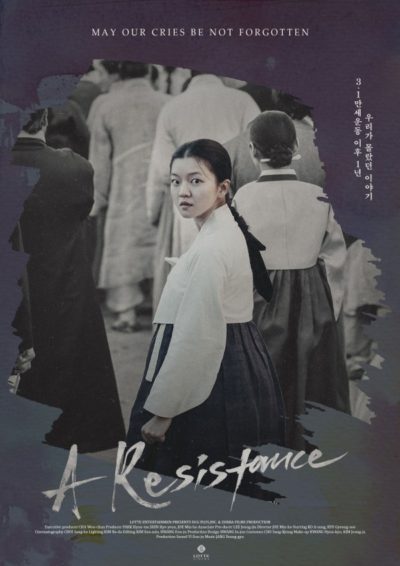★★★
“Not your usual women-in-prison film…”
 This takes place in 1919-20, when Korea was under occupation by the Japanese [there seems to be quite a lot of this about; I’ve seen a bunch of Chinese movies set when that country was occupied by Japan as well]. Even demonstrating against the Japanese, or in favour of Korean independence, was sternly forbidden, with those taking part likely to be arrested and thrown in prison for months. If they were lucky, that is: an opening caption tells us 7,500 were killed in the protests or died in jail subsequently. Even for those merely arrested, this was not a “nice” prison, to put it mildly, with horrendously over-crowded conditions (24 to a cell!), freezing temperatures and meagre rations.
This takes place in 1919-20, when Korea was under occupation by the Japanese [there seems to be quite a lot of this about; I’ve seen a bunch of Chinese movies set when that country was occupied by Japan as well]. Even demonstrating against the Japanese, or in favour of Korean independence, was sternly forbidden, with those taking part likely to be arrested and thrown in prison for months. If they were lucky, that is: an opening caption tells us 7,500 were killed in the protests or died in jail subsequently. Even for those merely arrested, this was not a “nice” prison, to put it mildly, with horrendously over-crowded conditions (24 to a cell!), freezing temperatures and meagre rations.
Once such prisoner was Yu Gwan Sun (Go), 16 years old at the time of her imprisonment: her sentence was three years, due to contempt of court being added on to the normal charge. However, she would not be cowed by the punishment, and refused to bow to the will of her captors – for example, refusing to speak to them in Japanese, even though she could. Such disrespect, and her “defiant face”, inevitably brought Yu into conflict with the authorities, including the warden, and Korean collaborator Jung Chun-young, who acts as a translator. They try to break her will, but her refusal to accept even her status as a prisoner, never mind their authority, remains defiant.
The historical Yu does seem to have been an unrepentant, patriotic bad-ass, sometimes referred to as Korea’s Joan of Arc, and with at least half a dozen films based on her life story. While in prison, she wrote: “Even if my fingernails are torn out, my nose and ears are ripped apart, and my legs and arms are crushed, this physical pain does not compare to the pain of losing my nation… My only remorse is not being able to do more than dedicating my life to my country.” Joe films almost the whole movie in stark black-and-white, save for occasional coloured flashbacks, and music is also used sparingly. This certainly gives a realism to proceedings, though I did feel the portrayal here was a bit too good to be true – putting the “Saint” in “Saint Joan”, if you wish.
It may also be a little restrained, with the tortures inflicted on her coming across as little more than an inconvenience. Perhaps the little things here are most effective, such as the prisoners sharing body warmth, to try and protect a new-born baby. It builds to Yu’s carefully crafted act of defiance, leading a cheer for Korean independence which flows through the prison and to the outside world, triggering further anti-Japanese protests. Even after her fellow inmates are released, she is kept in jail: the final lines of dialogue are an exchange that sums up her obstinate refusal to give up. Asked “Why must you do this?,” Yu almost shrugs: “Then who will?” [She died at age 17, still in jail, a few days before her scheduled release date.] This shines a light onto an area of history I knew nothing about, though I’m hard pushed to say it illuminated much more than the heroine.
Dir: Joe Min-ho
Star: Go Ah-sung, Ryu Kyung-soo, Kim Sae-byuk, Kim Ye-eun




